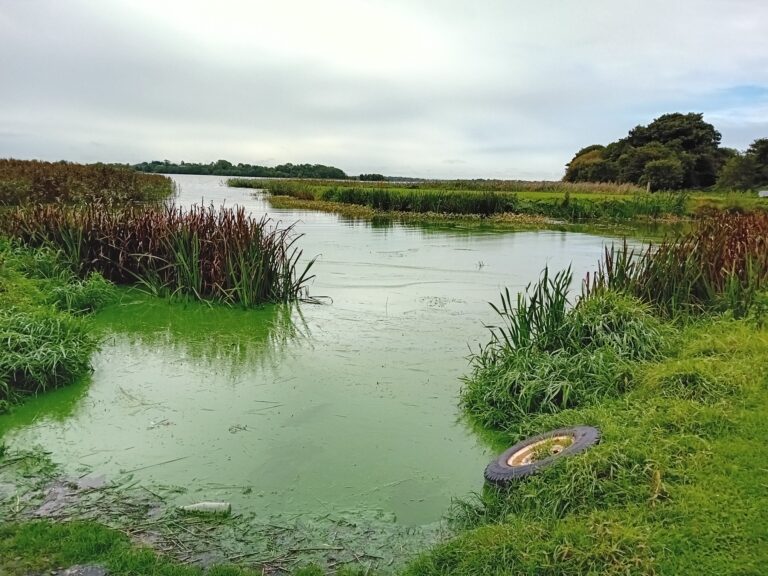Project Description
Lough Neagh, located in Northern Ireland, is the largest freshwater lake in the British Isles, covering 383 km2 with a mean depth of 8.9 meters. It is fed by 6 main rivers, and is surrounded by wetlands, marshes, and agricultural land as well as several towns and villages with a total population of around 470,000 people living within the catchment. The Lough supports a rich biodiversity, and is recognised as important for both fish and birds, including wintering waterfowl, breeding waders, and protected fish species. The Lough is also economically important – 40% of the drinking water in Northern Ireland is supplied from the Lough, it is the site of Europe’s largest commercial eel fishery, and is central to the economy of local communities.
However, Lough Neagh faces external pressures, including terrestrial pollution, invasive species, aggregate extraction and fishing. These impacts may be amplified by the changing climate and warming waters; forecasts predict further changes in the temperature and water levels of the Lough, further impacting the ecology and function of the system.
In 2023, Lough Neagh experienced an unprecedented bloom of harmful blue-green algae, raising concerns about the lake’s health. The bloom was likely caused by a combination of factors, including nutrient pollution, atypical weather patterns (warm spring and exceptionally wet summer) and the impacts of non-native species on the ecosystem – notably zebra mussels (Dreissena polymorpha), which compete with native species for resources and alter water and sediment quality. With climate change, it is anticipated that the frequency and magnitude of these algal blooms may increase, impacting both the ecosystem and economy. The events of 2023 have highlighted the need for enhanced understanding of the phenomena and effective management strategies to address nutrient pollution and eutrophication. To address this the Agri-Food and Biosciences Institute (AFBI) are developing a Soil and Water Assessment Tool (SWAT) model for the Lough Neagh watershed (similar to those for the ‘Living With Water’ and ‘SWELL’ projects), which will quantify the agricultural and urban runoff, urban wastewater discharges, agricultural land use and management practices in the Lough Neagh catchment.
This PhD project will build upon this work combining aspects of ecology, modelling and genomics to refine the model and extend to a full ecosystem analysis explicitly including the Lough body. While there is a range of directions that the project may take, it is anticipated that the main questions addressed will be: 1) The ecological response to physical and chemical drivers – such as the impacts of increased temperatures and eutrophication on the community structure, and impacts of algal blooms on biodiversity by building on AFBI’s existing modelling framework. 2) The role of invasive species – in particular, the potential role of D. polymorpha; through increasing light penetration; cycling of nutrients and carbon between water and sediment; and selective feeding behaviour (to include feeding experiments and the use of eDNA and metabarcoding) and the downstream impacts of those changes on oxygen budgets and freshwater fauna. 3) Scenario modelling of mitigation strategies, such as management strategies for reducing nutrient loads from agricultural land; urban and industrial sources; and the modelling of nature-based solutions, for example riparian buffer zones. The student will also have opportunities to study how the Lough Neagh ecosystem responds to climate change – with the aim of understanding the interactions between active policy development by DAERA and future climates in Northern Ireland.
CANDIDATE BACKGROUND
There is opportunity within this project for the PhD student to focus the direction in line with their skills and/or interests. Applicants must have a good degree in biology, ecology, conservation or environmental science. Field based skills in sampling FW or marine systems are essential, as are basic programming skills. Experience with either modelling or genomics is desirable, as is a full and clean driving license. Interested applicants are encourage to contact s.helyar@qub.ac.uk to discuss project scope.
Photo credit: R. Ingram, AFBI (image is copyright protected)
Supervisors
Sarah HelyarPrimary Supervisor: | Profile: Sarah Helyar Email: s.helyar@qub.ac.uk Institution: Queen's University, Belfast Department/School: School of Biological Sciences |
Stuart PiertneySecondary Supervisor: | Profile: Stuart Piertney Email: s.piertney@abdn.ac.uk Institution: University of Aberdeen Department/School: School of Biological Sciences |
Paul CaplatAdditional Supervisor: | Profile: Paul Caplat Email: p.caplat@qub.ac.uk Institution: Queen's University, Belfast Department/School: School of Biological Sciences |
Additional Supervisor: | Dr Jay Calvery and Dr Adam Mellor Agri-Food and Biosciences Institute |
References
Vanderploeg, Henry A.; Johengen, Thomas H.; and Liebig, James R., (2008) Feedback between zebra mussel selective feeding and algal composition affects mussel condition: did the regime changer pay a price for its success? Freshwater Biology 54, 47–63.
Ferreira, J. G.; Service, M.; Moore, H.; Diedricks, G; Gomes, D; Bernard-Jannin, L.; Cabrillo, A; Silva, J., L.; Calvert, J., (2021). Development and application of an ecological modelling framework For Inner Dundrum Bay. https://www.researchgate.net/publication/360631434_Development_and_application_of_an_ecological_modelling_framework_for_Inner_Dundrum_Bay
Pompanon F., Deagle B. E., Symondson W. O., Brown D. S., Jarman S. N., Taberlet P. (2012). Who is eating what: diet assessment using next generation sequencing. Mol. Ecol. 21 (8), 1931–1950.
QUADRAT Themes
- biodiversity
- environmental-management
Partners
CASE Partnership with Agri-Food and Biosciences Institute
A CASE Partnership project is delivered in collaboration with an industry partner. The CASE partner organisation contributes finance, expertise, facilities and an internship.






















































